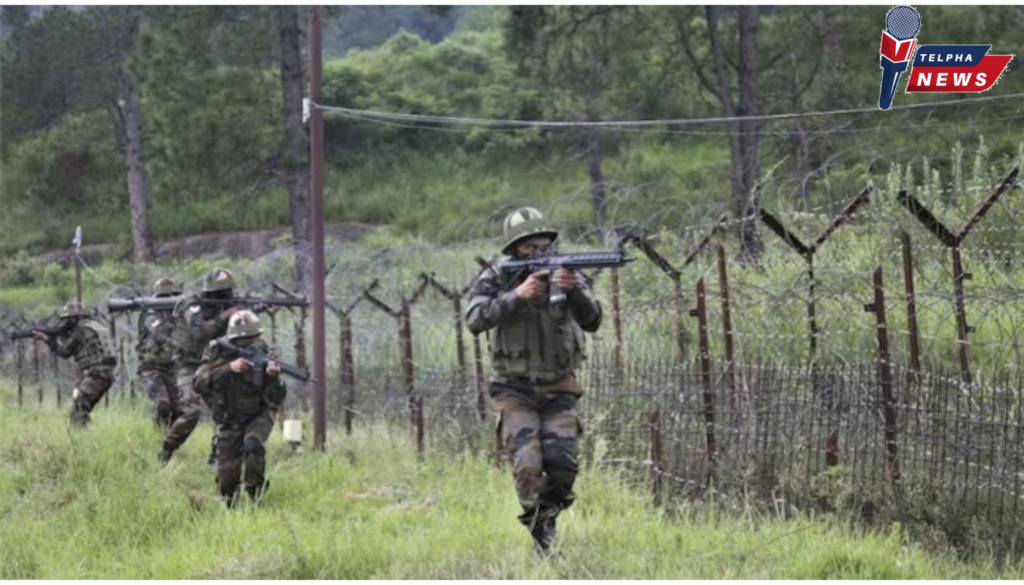A ceasefire violation by Pakistani Rangers was reported in Jammu and Kashmir’s Pooch district on late Friday night, prompting strong retaliation by the Indian Army.

Ceasefire Violation in Poonch: A Wake-Up Call for Vigilance and Preparedness
In the delicate and often volatile region of Jammu and Kashmir, ceasefire violations have become a stark reminder of the ongoing tensions between India and Pakistan. On the night of June 28, 2024, Pakistani Rangers initiated unprovoked firing on Indian posts along the International Border in the Krishna Ghati Sector of Poonch district. This act of aggression, although not unprecedented, highlights the fragile nature of the peace along the Line of Control (LoC).
Details of the Incident
According to reports, the Pakistani troops targeted forward Indian posts, prompting a strong and swift retaliation from the Indian Army. The exchange of fire was brief but intense, causing no casualties but raising significant security concerns. The Indian Army’s response was described as “befitting,” underlining their readiness to defend national sovereignty against any form of aggression.
Possible Motives and Implications
Sources indicate that such ceasefire violations are often used as a cover for terrorist infiltration. The recent firing in the Krishna Ghati Sector is believed to be an attempt to provide cover fire for terrorists attempting to infiltrate into Indian territory. This strategy, while not new, poses a dual threat: direct military aggression and the infiltration of terrorists, both of which can destabilize the region and endanger lives.
In response to this incident, security forces have heightened their vigilance along the LoC. A thorough search operation is underway to ensure that no infiltration attempts succeed. The Indian Army’s preparedness and prompt response serve as a deterrent to further provocations and underscore the importance of maintaining a robust defense posture.
The Broader Context
Ceasefire violations like this one are part of a larger pattern of cross-border tensions that have characterized India-Pakistan relations for decades. These incidents not only strain bilateral relations but also pose significant risks to regional stability and security. The international community often watches these developments closely, as they can have far-reaching implications for peace and security in South Asia.
Understanding Ceasefire Violations
For those following geopolitical developments, understanding the dynamics of ceasefire violations is crucial. These incidents are not isolated; they reflect the broader security challenges and strategic calculations of both nations. Here are a few key points to consider:
- Historical Context: Ceasefire violations have been a recurring issue since the partition of India and Pakistan. Understanding this historical context is essential for comprehending the current dynamics.
- Strategic Significance: The LoC in Jammu and Kashmir is a strategically significant region. Control over this area has implications for national security and regional power dynamics.
- Human Impact: Beyond the geopolitical implications, ceasefire violations have a direct impact on the lives of soldiers and civilians living in border areas. Their safety and well-being are often at risk.
- Media and Perception: How these incidents are reported and perceived can influence public opinion and policy decisions. Media coverage plays a critical role in shaping the narrative around ceasefire violations.
Conclusion
The recent ceasefire violation in Poonch serves as a stark reminder of the ongoing challenges in maintaining peace along the LoC. It underscores the importance of vigilance, preparedness, and a strong defense posture. As we continue to monitor these developments, it’s essential to stay informed and understand the broader implications of such incidents.
In the face of these challenges, the commitment of the Indian Army and security forces to protect national sovereignty and ensure the safety of citizens is commendable. While ceasefire violations pose significant risks, they also highlight the resilience and readiness of those tasked with defending our borders.
Stay tuned for more updates on this and other important geopolitical developments. Your engagement and understanding are crucial in navigating the complexities of regional security.